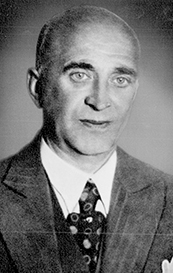Search for Names, Places and Biographies
Already layed Stumbling Stones
Suche
Johann Heinrich Karl Wibrow * 1882
Schulweg 42 (Eimsbüttel, Eimsbüttel)
Hamburg Gefängnis-Hütten
ermordet am 31.5.1937 von Gestapo
Johann Heinrich Karl Wibrow, born on 6 Dec. 1882 in Altona, "protective custody” in the Hamburg-Hütten prison on 27 May 1937, murdered on 31 May 1937 by the Gestapo
Schulweg 42
Heinrich Wibrow’s parents were Claus Friedrich Carl Wibrow and Anna Auguste Magdalene Louise, née Holst, both Protestants. The father was a carpenter. When Johann Heinrich Karl Wibrow, as his full name read, was born in Dec. 1882 in Altona, his parents lived at Weidenstrasse 27 (today Virchowstrasse and Karl-Wolff-Strasse).
Heinrich attended the eight-grade elementary school (Volksschule) in Altona and completed a commercial apprenticeship. From 1905 to 1915, he worked for Sally Wachtel in the ready-to-wear fur clothing wholesale at Grosse Reichenstrasse 65. In 1912, Heinrich Wibrow and Berta Stäker married. At the time of the wedding, the bride and groom still lived with their parents: Heinrich in Altona at Königstrasse 114 on the third floor and Berta Stäker (born in 1885, died on 11 June 1971) in Eimsbüttel at Marthastrasse 43, house A on the third floor. One year later, H. Wibrow was listed in the Hamburg directory under the job designation of "traveling salesman,” first with the address at Grädenerstrasse 6, later with the address at Schulweg 42. The young couple apparently moved to Eimsbüttel, where they finally settled. The marriage produced two daughters – Ilse and Dina. From 1915 until the end of the war, Heinrich Wibrow served as a soldier in the First World War. From 1919 to 1924, he ran a jam shop at Schulweg 42, and from 1925, he operated a fur shop at the same address. Berta Wibrow continued the fur trade on Schulweg after Heinrich’s death. The house no longer exists. Today, the "Leder Israel” store is located at the intersection of Schulweg/Osterstrasse.
Heinrich Wibrow had become an Eimsbüttel businessman, who maintained contact with other retailers in the district and assumed civic duties. For example, in "elections,” as referendums were still called under National Socialism, even though all parties apart from the Nazi Party were banned, he often held the office of election official. Most of the polls were held after Hitler’s solo attempts at foreign policy to demonstrate that the German people were behind his political leadership. On 29 Mar. 1936, the aim was to "legitimize” the occupation of the Rhineland. In this instance, too, Heinrich Wibrow worked in the polling station at the elementary school for boys on Osterstrasse. As Heinrich Wibrow was not one of the supporters of Nazism, he was indignant on election day about a group of SA men openly violating the secrecy of the ballot, visiting voters at home, and influencing their voting. The polling station also appears to have been the scene of fraud during the counting of votes.
In a state under arbitrary rule, it sometimes seems pointless to ask for a concrete reason for persecution. However, matters revolved around such a "reason” in the restitution proceedings (Wiedergutmachungsverfahren). On 27 May 1937, Heinrich Wibrow had to report to the Gestapo at Stadthausbrücke. From there, he called his wife to tell her he had to stay there for some time yet. Four days later, she received a call from an official who told her that her husband had hanged himself. On official orders, the caller went on, an interment was not possible, and the body had to be burnt. In the register of deaths, it was noted that Heinrich Wibrow died on his way to the Harbor Hospital, where an autopsy took place. Whether Heinrich Wibrow fled to his death or was tortured and murdered by the Gestapo cannot be clarified. His wife suspected that the dispute with the SA men on election day was the reason for his summons and his death. This resulted in an incorrect chronological classification, because the election was already in the spring of 1936 – and not in 1937, as initially stated – and the "protective custody” ("Schutzhaft”) took place more than one year later.
In the restitution proceedings, another explanation was then put forward by the authority: Heinrich Wibrow’s alleged homosexuality and his alleged violation of Sec. 175 [of the Reich Criminal Code]. At the end of 1936, Heinrich Wibrow had been accused by one Carl Franke from Eimsbüttel of "approaching him homosexually.” After his imprisonment, he was interrogated in the Hütten prison and admitted to homosexual "crimes.” These statements were probably made under torture, and there is no indication that this "confession” had any real basis. This coerced "confession” could be a reason for his suicide.
At any rate, in the restitution proceedings, after long arguments it was recognized that he was persecuted politically, and his widow received a survivor’s pension.
Translator: Erwin Fink
Kindly supported by the Hermann Reemtsma Stiftung, Hamburg.
Stand: May 2019
© Susanne Lohmeyer
Quellen: StaH 242-1 II Gefängnisverwaltung, Ablieferungen 13 und 16; StaH 332-5 Standesämter, 6224 und 3386/1882; StaH 332-5, 6004 + 124/1912; StaH 332-5, 1071 und 120/1937; StaH 351-11 AfW, 7895; HAB I 1941; HAB II 1913 und 1916.


